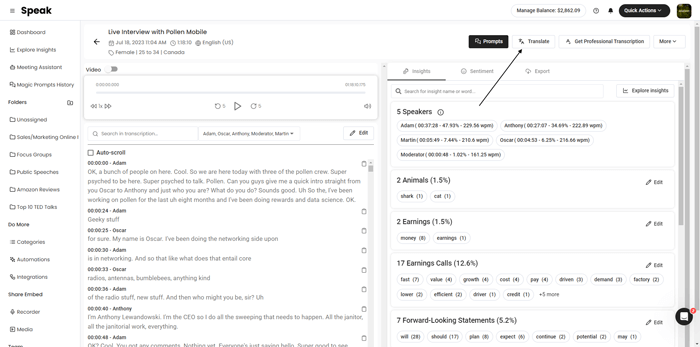Use Speak's Translator For Automatic AI Translation
Instantly generate highly accurate AI translations in over 99 languages within Speak for better analysis, knowledge bases, global reach and more.
Get a 7-day trial with 2 hours of free transcription!
Trusted by 150,000+ incredible people and teams



































Unlock the power of Speak's AI Translation

How Does Speak's AI Translator Work?
- 99 languages
- 9,805 combinations of translation
- Very simple to order
- Audio, video and text
- Order individually or in bulk
- Creates labelled text notes
- Translates almost instantly
- Industry-leading accuracy
- Cost is $30 USD per million char
- Auto-calculates and charges
View all Speak Translator AI Translation Options:
Frequently Asked Questions
Answers to common questions about pricing, billing and product features.
We have users from all different industries, job titles and locations, but we find that market researchers, qualitative researchers, academic researchers, education institutions, digital marketers, and go-to-market teams get the most value out of Speak.
We want you to be able to build the perfect plan that works for you and encourage you to play around with the custom calculator. If you’re just looking for a quick way to start using Speak, we recommend just going with the Starter Plan and you can always build a custom plan once you better understand what you need.
Yes, you can cancel your subscription anytime (no retroactive refunds). Once you have cancelled, you will have access to Speak and all your files until the end of your subscription cycle.
Yes! You can change your plan anytime. When you downgrade/update, your new subscription will be applied in the following billing cycle.
Speak supports more than 70 languages for transcription! We also have many languages compatible with analysis and Speak Magic Prompts.
We continue to add more regularly!
You can view the full list of supported languages.
Absolutely!
We love doing demos of Speak to ensure that you are set up for success.
Use our dedicated Calendly link to meet directly with one of our team members.
Absolutely!
Speak does more than just transcribe and is a useful tool to analyze existing transcripts you may have.
If you decide to get professional or automated transcription in the future you can add to your account balance.
We have a team option that allows you to manage and share account access with your team. There is a $5/user cost for each additional person you bring onto your plan.
We can offer discounts on monthly plans if you are an education institution, student or nonprofit. If you don't fit into one of those categories, there are great discounts available for all plans if you sign up for more than a month!
Check our dedicated Speak pricing page to learn more.
Yes, of course! Speak offers many great options for exporting and customizing file types so you can the most value out of your transcriptions.
We currently offer TXT, SRT, Word Doc, PDF, TXT, SRT, VTT, CSV and JSON file exports.
You can learn more about exporting files from Speak in our dedicated guide.
Save time and money with Speak's leading AI translation.
Instantly generate highly accurate AI translations in over 99 languages within Speak for better analysis, knowledge bases, global reach and more.
Get a 7-day fully-featured trial.



